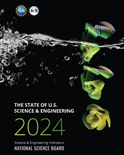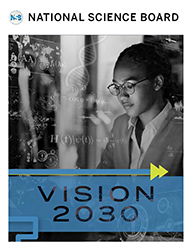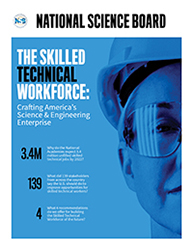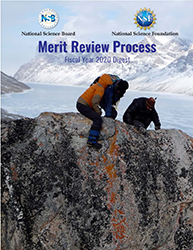News Release 16-060
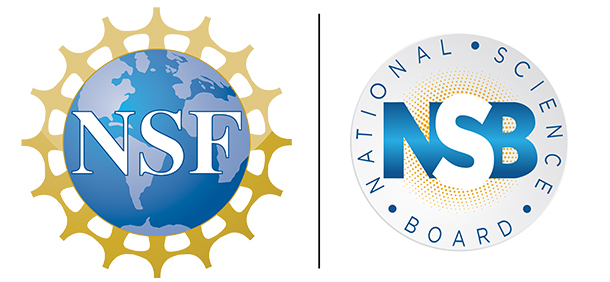
NSB elects new leadership
The National Science Board taps Maria Zuber as its chairperson and Diane Souvaine for vice chairperson
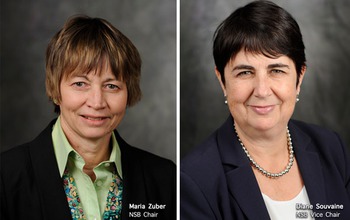
NSB Chair Maria Zuber and NSB Vice Chair Diane Souvaine (Credit and Larger Version)
May 24, 2016
For the first time in National Science Foundation (NSF) history, women hold the positions of director and National Science Board (NSB) chair, and vice chair. During its May meeting, the board, which serves as the governing body for NSF, elected Maria Zuber, vice president for research at the Massachusetts Institute of Technology, as chair and Diane Souvaine, vice provost for research at Tufts University, as vice chair. They replace Dan Arvizu and Kelvin Droegemeier, who both rotated off the board after serving 12 years, the last four as chair and vice chair, respectively.
Zuber's research bridges planetary geophysics and the technology of space-based laser and radio systems, and she has published over 200 papers. She has held leadership roles associated with scientific experiments or instrumentation on nine NASA missions and remains involved with six of these missions. She is a member of the National Academy of Sciences and American Philosophical Society and is a fellow for the American Academy of Arts and Sciences, the American Association for the Advancement of Science, the Geological Society and the American Geophysical Union. In 2002, Discover magazine named her one of the 50 most important women in science. Zuber served on the Presidential Commission on the Implementation of United States Space Exploration Policy in 2004.
NSF Director and NSB member ex officio France Córdova said, "I am delighted to say, on behalf of NSF that we are thrilled with Dr. Zuber's election as chair and Dr. Souvaine’s election as vice chair of the National Science Board. As Dr. Zuber is a superb scientist and recognized university leader, she has the skills needed to help guide the agency's policies and programs. Coupled with Dr. Souvaine’s background in computer science, exemplary leadership skills, and expertise in budget oversight and strategy, NSB is well-positioned for the coming years. I look forward to working with both leaders as NSF launches new big ideas in science and engineering."
Zuber is in her fourth year on the board and has served on its Committee on Strategy and Budget, which advises on NSF's strategic direction and reviews the agency's budget submissions.
"It is a privilege to lead the National Science Board and to promote NSF's bold vision for research and education in science and engineering," Zuber said. "The outcomes of discovery science inspire the next generation and yield the knowledge that drives innovation and national competitiveness, and contribute to our quality of life. NSB is committed to working with director Córdova and her talented staff to assure that the very best ideas based on merit review are supported and that exciting, emerging opportunities -- many at the intersection of disciplines -- are pursued."
Souvaine is in her second term on the NSB and has served as chair of its Committee on Strategy and Budget, chair of its Committee on Programs and Plans, and as a member of its Committee on Audit and Oversight, all of which provide strategic direction, and oversight and guidance on NSF projects and programs. In addition, she co-chaired NSB's Task Force on Mid-Scale Research and served three years on the Executive Committee.
A theoretical computer scientist, Souvaine's research in computational geometry has commercial applications in materials engineering, microchip design, robotics and computer graphics. She was elected a fellow of the Association for Computing Machinery for her research and for her service on behalf of the computing community. A founding member, Souvaine served for over two years in the directorate of the NSF Science and Technology Center on Discrete Mathematics and Theoretical Computer Science that originally spanned Princeton University, Rutgers University, Bell Labs and Bell Communications Research. She also works to enhance pre-college mathematics and foundations of computing education and to advance opportunities for women and minorities in mathematics, science and engineering.
"I am truly honored and humbled by this vote of confidence from such esteemed colleagues. I do not take this responsibility lightly," Souvaine said. "The board is proud of NSF's accomplishments over its 66 years, from the discovery of gravitational waves at LIGO to our biennial Science and Engineering Indicators report on the state of our nation's science and engineering enterprise. I look forward to working with Congress, the Administration, the science and education communities, and NSF staff to continue the agency's legacy in advancing the progress of science."
Jointly, the 24-member board and the director pursue the goals and function of the foundation. NSB establishes NSF policies within the framework of applicable national policies set forth by the President and Congress. NSB identifies issues critical to NSF's future, approves the agency's strategic budget directions and the annual budget submission to the Office of Management and Budget, and new major programs and awards. The board also serves as an independent body of advisers to both the President and Congress on policy matters related to science and engineering and education in science and engineering. In addition to major reports, NSB publishes policy papers and statements on issues of importance to U.S. science and engineering.
The President appoints board members, selected for their eminence in research, education or public service and records of distinguished service and who represent a variety of science and engineering disciplines and geographic areas. Board members serve six-year terms and the President may reappoint members for a second term. NSF's director is an ex officio 25th member of the board.
-NSF-
Media Contacts
Brandon Powell, NSB, (703) 292-2769, bjpowell@nsf.govKimberly Allen, Massachusetts Institute of Technology, (617) 253-2702, allenkc@mit.edu
Kimberly Thurler, Tufts University, (617) 627-3175, kim.thurler@tufts.edu
Useful NSB Web Sites:
Home Page: http://www.nsf.gov/nsb
Media Contact: http://www.nsf.gov/staff/staff_bio.jsp?lan=nlymn&org=NSF
News: http://www.nsf.gov/nsb/news
Meetings: http://www.nsf.gov/nsb/meetings
Publications: http://www.nsf.gov/nsb/publications
Facebook: https://www.facebook.com/NationalScienceBoard
Twitter: Twitter: https://twitter.com/intent/user?screen_name=NSF_NSB
YouTube: https://www.youtube.com/channel/UCkrHRzuGSrPp2haQs0T_Pww
To view PDF documents, please download Adobe Acrobat Reader.
